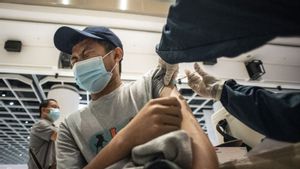JAKARTA - There has been an increase in the COVID-19 cluster in DKI Jakarta offices at this time. In the period April 5-11, 2021, there were 157 cases of COVID-19 in 78 offices. Then on April 12-18, the number of cases increased to 425 people in 177 offices. This means, there are an additional 268 patients in one week.
An epidemiologist from Griffith University Australia, Dicky Budiman mapped three causes for the increase in transmission of COVID-19 in the work environment.
First is the government's neglect or the inadequate response taken by the government in controlling pandemics, especially in the aspects of testing, tracing treatment (3T), and vaccination education.
"This must be evaluated by the local government. Because there could be one of the 3T methods that are not strong. This can certainly be seen from the positivity rate, which is still above 5 percent", said Dicky to VOI, Thursday, April 29.
The second factor is the weakness of the health protocols that are implemented in the office or workplace. In fact, it could be the implementation of the protocol that is wrong.
Dicky gave an example, many face-to-face meetings (offline meetings) were held in uncontrolled situations. In addition, the number of employees who started working in the office or work from the office (WFO) tends to increase or approach the situation before the pandemic.
SEE ALSO:
Dicky asked the company to understand that vaccinated people are not unlikely to be infected with COVID-19. It's just that, it reduces the risk of illness and death when infected.
"This is wrong too. Working from home (WFH) must be maintained. Even though the person who was comorbid and works at home because of the high risk, continues to be vaccinated, he was ordered to work from the office, it was wrong", he said.
"WFH is one of the most realistic interventions in Indonesia today. Because of this office work they get regular monthly income, unlike people who do not have a regular income", he added.
Then, the third factor that causes this office cluster is the weak monitoring and evaluation of occupational health in offices.
"Of course, there must be a role for the government, such as the Ministry of Manpower and the Department of Manpower and also with the Health Office. Supervision and evaluation must be improved. If there is no monitoring, the company will ignore it", concluded Dicky.
The English, Chinese, Japanese, Arabic, and French versions are automatically generated by the AI. So there may still be inaccuracies in translating, please always see Indonesian as our main language. (system supported by DigitalSiber.id)




















